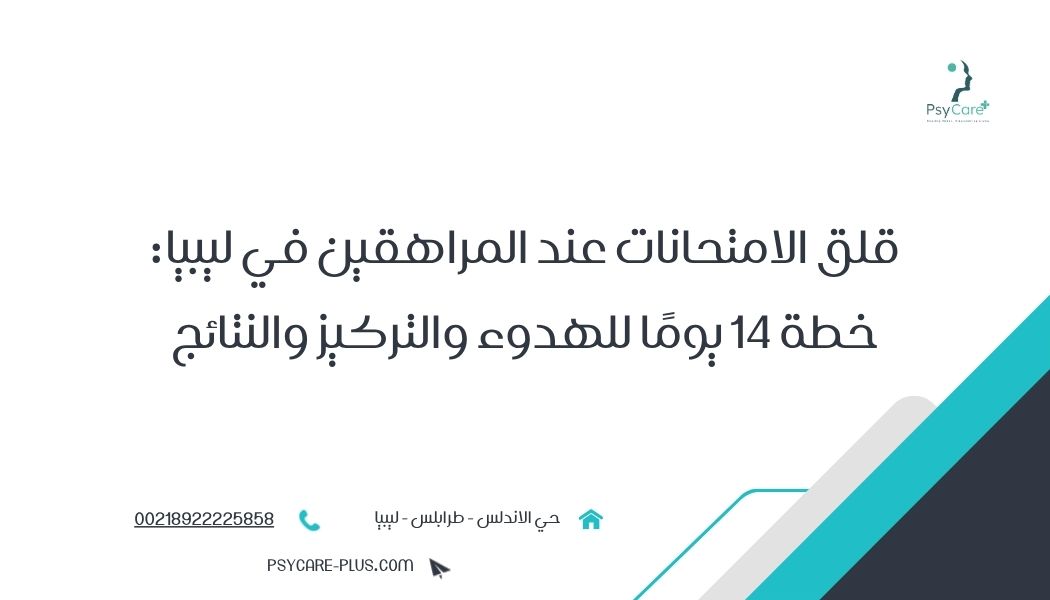Exam Anxiety in Libyan Teens: A 14-Day Plan for Calm, Focus, and Results
Practical CBT + Regulated Breathing + Realistic Study Routines + Test-Day Playbook

Exam Anxiety in Libyan Teens: A 14-Day Plan for Calm, Focus, and Results
Note: Educational guide—not an emergency service. For immediate risk, contact local emergency services. For structured care: Therapists — PyCare Plus on Google Play — Who We Are — Blog — Contact Us.
Why exam anxiety spikes
As exams approach, the brain treats time pressure as “threat,” fueling arousal (palpitations, tension), catastrophic thoughts (“If I fail…”), procrastination, and all-nighters. Short-term relief (avoidance/reassurance) strengthens the loop. CBT breaks it with small, repeatable steps: body regulation, balanced thinking, and structured action.
Quick tools before you begin
-
4–6 breathing: inhale 4s (nose), exhale 6s (mouth) × 6–8 cycles.
-
3-2-1 grounding: 3 things you see, 2 you touch, 1 you hear.
-
20–5 rule: 20 minutes focused study + 5 minutes break (simple Pomodoro).
-
No caffeine after late afternoon to protect sleep.
-
Simple desk: tidy space, phone on DND, basic paper notes.
14-Day Plan (customizable)
Aim: lower anxiety, increase focus, and build a realistic path.
Daily dose: 2–3 hours of net study (in blocks) + 7.5–8.5h sleep.
Days 1–2 — Setup
-
List exam subjects and topics per subject.
-
Flag the 3 hardest topics (red items).
-
Draft a 14-day grid: 2 topics/day (one hard + one medium).
-
Do 2–3 20–5 blocks/day with 4–6 before each block.
Days 3–4 — CBT for study
-
Catastrophic thought: “I will fail.”
-
Counter-evidence: past solved items/3 parts I already understand.
-
Balanced line: “Anxiety is normal—today’s target is 3 drills + a one-page summary.”
-
Start each session with a behavioral win (solve 5 short items) before any long reading.
Days 5–6 — Early self-testing
-
Per subject: 15-minute quiz (from past papers), no notes.
-
Review errors; write the reason (careless/content/time).
-
Fix “content” with a two-line summary + Q/A flashcard.
Day 7 — Consolidation
-
Morning: review flashcards 30 minutes.
-
Midday: 20-minute mock for a difficult subject.
-
Evening: 20-minute walk + early sleep.
Days 8–10 — Increase dose
-
Add one more 20–5 block (3–4 blocks/day).
-
By Day 10: 25-minute mock per subject.
-
Cut rituals: don’t reread the same chapter thrice; move forward as planned.
Days 11–12 — Simulate exam time/place
-
Sit at the same hour as the real exam; respect time limits.
-
No phone/music/books during the mock.
-
After: list Top-5 repeated mistakes and a correction plan.
Day 13 — Smart light day
-
Flashcards only + two items per red topic.
-
4–6 breathing AM/PM.
-
Pack tools/ID/water/snacks.
Day 14 — Test Day
-
Light breakfast (protein + easy carbs) and water.
-
4–6 three times: leaving home/entering hall/just before start.
-
Solve strategy:
-
90-second scan.
-
Finish the easy 60–70% first.
-
Return to hard items; chunk them (outline → details).
-
-
Final minute: check marks only—no full rewrites.
Family support—without raising anxiety
-
Supportive language: “We see your effort… the plan is clear… one step at a time.”
-
Skip daily grilling (“How many hours?”). Ask: “Top 3 questions you nailed today?”
-
Home routine: quiet 2 hours/day + light snack + early sleep.
-
No over-reassurance: swap “You’ll get top grades” with “You’re doing the work—we’re proud of the effort.”
Sleep & focus (the real edge)
-
Fixed wake time; morning light 10 minutes.
-
Digital sunset 1 hour pre-bed; no late caffeine.
-
If insomniac: 4–6 in bed + 10 minutes paper reading.
One-minute test kit
-
Anchor line: “Anxiety is normal—two easy questions first.”
-
Pocket cue: “4–6 × 3.”
-
Chunk the hard item: circle the verb, outline bullets, then write.
When to get a quick consult
-
Frequent panic spikes blocking entry/seating.
-
Severe insomnia > 3 nights.
-
Total social withdrawal or notable weight/appetite change.
-
Persistent dark thoughts.
Book a brief online assessment with a psychiatrist/psychotherapist via Therapists.
FAQs
Do stimulants help? Overuse increases anxiety and wrecks sleep; balance wins.
Study at night? Sleep consolidates memory; early morning + 20-min nap beats all-nighters.
What if I blank out? Pause 30 seconds, 4–6 × 3, write bullet points first—memory returns when structure leads.
Start now
-
Download & book support: PyCare Plus — Google Play
-
Choose your clinician: Therapists
-
Learn our ethos: Who We Are
-
More skills: Blog
-
Questions? Contact Us
Exams are a stage, not a verdict. Small, steady steps beat panic—every time.




